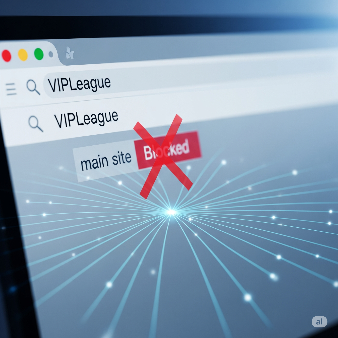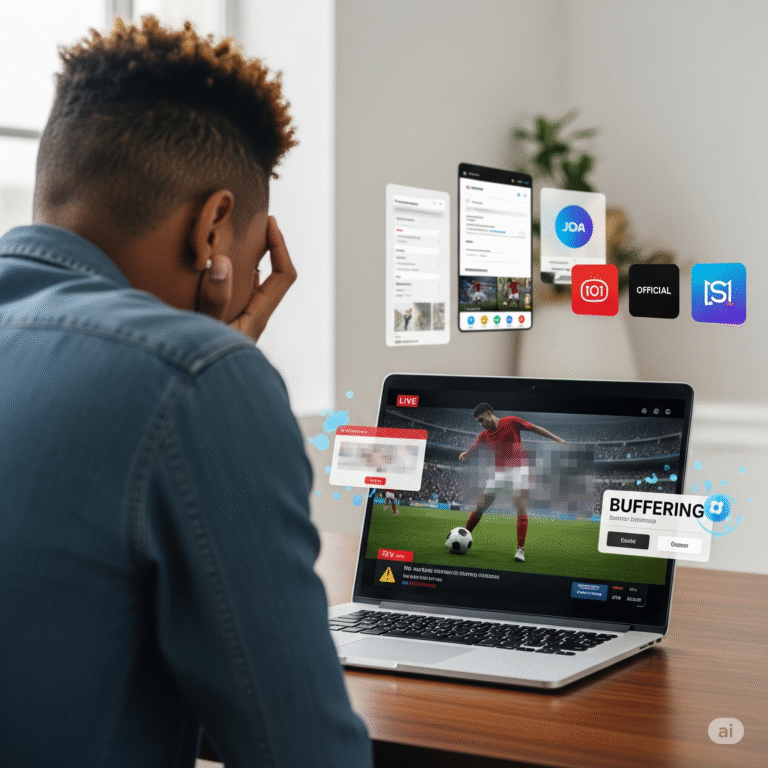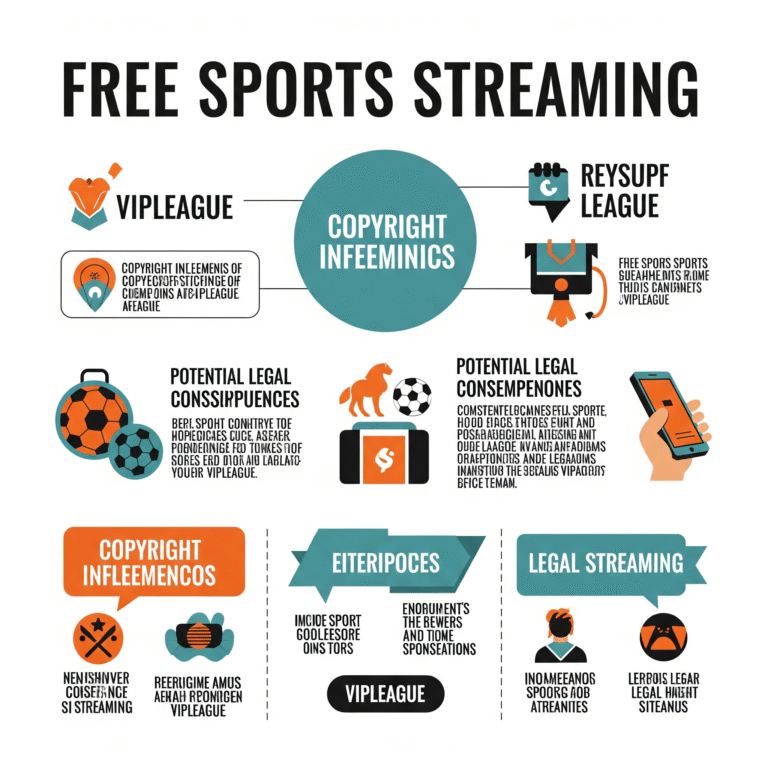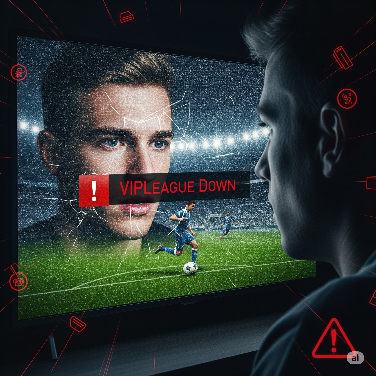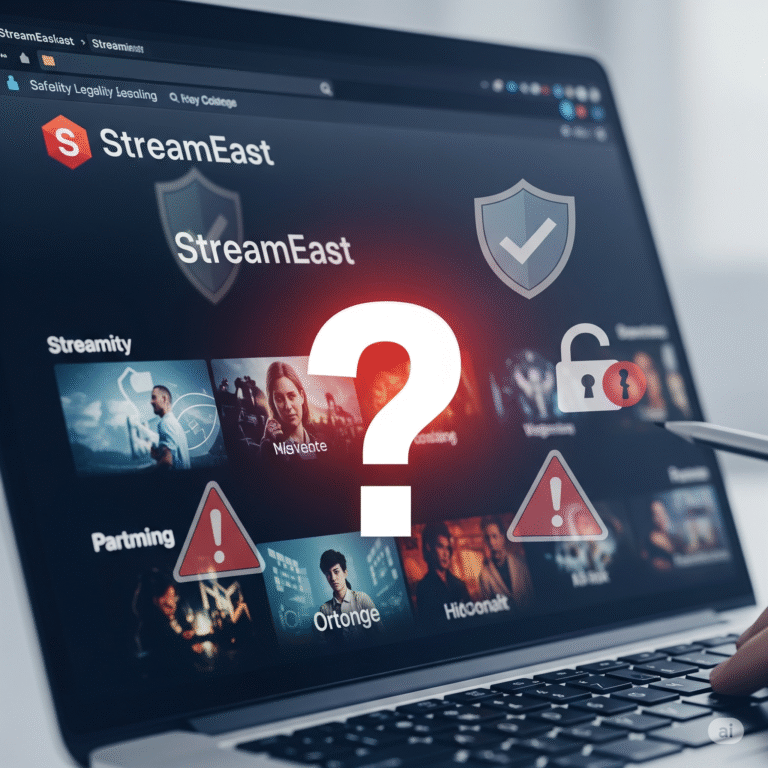3 DNS Secrets Behind VIPLeague Blocks (Why Your “Free” Stream Disappears!)
The electrifying energy of a live sporting event is an experience unparalleled in its ability to captivate and unite fans worldwide. From the thunderous roars of a packed football stadium during a crucial match to the nail-biting tension of a basketball game’s final seconds, or the sheer velocity of a Formula 1 Grand Prix, sports enthusiasts are driven by an insatiable desire to connect with every moment of the action. This global passion has fueled a widespread search for accessible live streams, often leading millions to online platforms that promise direct access without a traditional subscription. Consequently, a critical question frequently arises among viewers: “Why does my VIPLeague stream keep buffering?“
In our rapidly evolving digital landscape, the allure of “free sports streaming” seems compelling, offering the enticing prospect of bypassing often costly broadcasting subscriptions and pay-per-view events. Many users actively search for terms like “free live streaming websites,” “free sports streaming apps,” or specific platforms like “Stream2Watch,” seeking an easy solution. However, this apparent convenience often conceals a complex legal Reality fraught with technical frustrations, relentless, intrusive advertisements, and significant cybersecurity vulnerabilities. When faced with such problems, users often wonder, “Why does my ‘free’ stream disappear?” This article will explore the causes of stream instability, highlight the unique challenges posed by unauthorized sources like VIPLeague, and, most importantly, guide users toward making informed choices for a safe, ethical, and fully compliant viewing experience.
Understanding Buffering: What is Happening When Your Stream Pauses?
To effectively tackle streaming interruptions, it is vital to first understand what buffering entails. Buffering, in simple terms, occurs when video playback temporarily pauses because the data being sent to a device cannot keep up with the demands of the stream. This often manifests as a frustrating freezing video, choppy audio, or the notorious spinning loading circle on screen.
Buffering fundamentally points to a mismatch between the data supply (the internet connection speed, the server’s capability) and the data demand (the stream’s quality, the device’s processing power). While buffering can occur across various platforms, it is disproportionately common and often more persistent on unofficial streaming sites. This disparity highlights a unique challenge: “Why is my streaming site buffering so much?” The answer usually lies in the inherent limitations and lack of robust infrastructure typical of unauthorized content providers, directly connecting to broader issues of content enforcement and piracy crackdown.
Common Causes of Buffering: Diagnosing the Root of Your Streaming Problem
Experiencing buffering, whether on VIPLeague or any other platform, can be caused by several factors. Diagnosing the specific cause is the first Step towards finding a lasting solution.
A. Your Internet Connection: The Foundation of Smooth Streaming
A reliable internet connection is paramount for uninterrupted streaming. Several issues can originate here:
- 1. Slow Internet Speed: High-quality video demands a consistent flow of data. If the connection is not fast enough, video playback creates a buffer while it loads additional content. Many users wonder, “Video keeps buffering but internet is fine.” However, “fine” for browsing is often insufficient for streaming high-definition content.
- 2. Network Congestion (At Home & ISP Level): Internet speed can be impacted by heavy usage. This issue may be caused by a crowded home network (multiple devices or users simultaneously consuming bandwidth) or broader ISP network congestion, especially during peak streaming hours (e.g., evenings), which can lead to questions like “Why does my sports streaming keep buffering?”
- 3. Weak Wi-Fi Signal & Interference: A weak Wi-Fi signal is a common culprit. The further a device is from its router, or if walls and other physical barriers interfere, the signal weakens. Interference from other electronic devices (like microwaves or Bluetooth gadgets) can also disrupt Wi-Fi. This is particularly relevant for “How to stop buffering on Smart TV” or other wireless devices.
- 4. ISP Throttling Streaming Services: Some Internet Service Providers (ISPs) may intentionally slow down bandwidth when they detect heavy streaming activity, a practice known as throttling. This can cause frustration and lead to “Why does live stream keep freezing?” even if the internet plan seems adequate.
B. Your Device & Software: The Playback Side of the Equation
Even with a perfect internet connection, a user’s device itself can cause buffering:
- 1. Outdated Hardware & Insufficient Processing Power: Older computers, phones, Smart TVs, or streaming sticks (such as Fire TV Sticks) may lack the necessary processing power (CPU/RAM) to smoothly decode high-resolution streams. Users often ask, “I have high-speed internet but slow buffering on TV” or “How to stop buffering when streaming on Firestick,” pointing to device limitations.
- 2. Outdated Software/Firmware/Drivers: Ensuring the operating system, web browser, streaming apps, graphics drivers, and device firmware are all up to date is crucial. Outdated software can lead to compatibility issues and performance bottlenecks.
- 3. Background Applications & Browser Overload: Running numerous applications or processes in the background can consume a significant amount of bandwidth and processing power, leaving insufficient resources for the stream. An overloaded browser (with too many tabs or extensions) can also cause performance issues.
C. The Streaming Source Itself: The VIPLeague Factor
This is where the unique challenges of unofficial platforms, such as VIPLeague, become evident. While common issues can cause buffering on any stream, VIPLeague-specific instability often stems from its operational model:
- 1. Overloaded Servers & Lack of Infrastructure: Unlike legitimate streaming services that invest heavily in robust global server networks and Content Delivery Networks (CDNs), unofficial sites typically lack this infrastructure. Their servers can easily become overloaded, especially during popular live events, resulting in frequent buffering and poor video quality. This directly addresses the question, “Why does my VIPLeague stream specifically have buffering issues?”
- 2. Inefficient Data Distribution & File Optimization: Unauthorized streams may not use optimized video file sizes and efficient content delivery mechanisms, further contributing to buffering.
- 3. The Illicit Nature & Takedowns: The constant legal pressures and associated domain changes mean streams are inherently unstable and prone to takedowns, leading to “Is VIPLeague down?” issues. This directly relates to broader efforts to combat piracy.
- 4. VIP League Fox Sports: Specific unofficial links, such as “VIP League fox sports,” often lead to inherent instability issues due to their unauthorized nature and constant content enforcement actions.
D. VPN Usage (When It Helps & When It Hinders)
A Virtual Private Network (VPN) offers privacy and can bypass ISP throttling, but it’s a double-edged sword for streaming. While a VPN encrypts user traffic, it can sometimes introduce latency or cause buffering if the server is located far away, overloaded, or if the VPN service itself is not optimized for streaming.
The Hidden Dangers of Buffering on Unofficial Sites (Reinforce Risks)
Experiencing buffering on unofficial platforms like VIPLeague is more than just a minor annoyance; it’s often a symptom of deeper, more concerning problems that expose users to significant risks.
- A. Beyond Frustration: Malware & Intrusive Ads: Buffering experiences on unofficial sites often coincide with cybersecurity risks. Pop-ups (frequently appearing when streams buffer or fail) can lead to malware, viruses, and phishing attempts. These aggressive ads are a common form of malvertising.
- B. Exacerbated Legal Exposure: Repeated attempts to access unstable unauthorized streams can increase a user’s digital footprint, potentially leading to more ISP warnings or closer scrutiny for copyright infringement. This relates to strong IP protection measures.
- C. Data Privacy Compromise: Unreliable connections and sketchy sites increase the risk of personal data breaches and unwanted tracking, as these platforms often lack robust privacy safeguards.
- D. The True Cost of “Free”: Buffering on such platforms is not just an inconvenience; it’s a symptom of a fundamentally insecure and non-compliant viewing method, highlighting the high cost of “free” content.
Troubleshooting Your Buffering Issues: Step-by-Step Fixes for Any Stream
While the inherent issues of unauthorized sites like VIPLeague often lead to unavoidable buffering, many common technical problems can be resolved to improve streaming performance on any platform, especially if opting for legal services.
A. First Aid: Quick & Easy Solutions to Stop Buffering
These initial steps can often resolve temporary glitches:
- 1. Reload Your Stream: A simple refresh of the webpage or restarting the streaming app can resolve minor, temporary issues.
- 2. Restart Your Device: A quick reboot of the computer, smartphone, tablet, or Smart TV clears minor software glitches.
- 3. Restart Your Router: Power cycling a router (unplugging for 20-30 seconds and plugging back in) can resolve IP conflicts and refresh the network connection, addressing “How to stop buffering when streaming.”
- 4. Test on an Alternative Device: This helps isolate whether the problem is device-specific or network-wide.
- 5. Lower the Streaming Quality: If buffering persists, temporarily reduce the video resolution (e.g., from 1080p to 720p or lower) to decrease bandwidth demands.
B. Device Optimization: Ensuring Your Hardware & Software Are Ready
A user’s playback device’s health significantly impacts streaming quality:
- 1. Clear Browser Cache and Cookies: Remove temporary files that can slow down browser performance.
- 2. Update Firmware, Drivers, and Streaming Apps: Ensure all software is up to date for optimal compatibility and performance.
- 3. Close Background Applications: Disable or close any unnecessary apps or processes running in the background, as they consume bandwidth and processing power that the stream needs.
- 4. Check Device Utilization: Monitor CPU and RAM usage to ensure sufficient computing resources for streaming.
- 5. Consider Device Upgrade: For older hardware, an upgrade might be necessary for modern HD or 4K streaming.
C. Network Optimization: Boosting Your Home & Internet Connection
Even with fast internet, a user’s home network setup can cause buffering:
- 1. Check Your Internet Speed: Run an online speed test (e.g., Ookla) to confirm the connection meets the recommended bandwidth for the desired streaming quality. This directly addresses “How to stop buffering when streaming on TV” and “How to stop buffering when streaming.”
- 2. Use a Wired Connection (Ethernet): For the most stable and fastest connection, connect a streaming device directly to the router via an Ethernet cable. Wired connections are less prone to interference and can handle higher data loads, especially for 4K streams.
- 3. Optimize Wi-Fi Signal: Improve router placement, shorten distance, or use 5 GHz band (if compatible).
- 4. Upgrade Wi-Fi Standard & Router: Consider upgrading to Wi-Fi 6 for increased data throughput and enhanced multitasking capabilities. Upgrade to a dual-band/tri-band router.
- 5. Limit Bandwidth-Heavy Activities: Coordinate with others on the network to avoid simultaneous bandwidth-intensive activities, such as large file downloads, online gaming, or video calls. This helps “Buffer live stream sport.”
- 6. Adjust Buffer Settings in Streaming App: If available, increase buffer size to give the stream more loading time.
- 7. Contact Your Internet Service Provider (ISP): If all other troubleshooting steps have been attempted and buffering persists, it may be time to contact your Internet Service Provider (ISP). They can check for network issues on their end or address concerns about throttling.
D. VPN Usage (Responsible Application):
- If using a VPN, temporarily disable it to check if it’s the cause of buffering. If that resolves the issue, try selecting a different server (one that is closer) or an optimized VPN.
- Crucially: Emphasize that VPNs are for privacy or accessing legally subscribed content (e.g., while traveling), not for making illegal streaming legal or accessing unauthorized content.
The Ultimate Solution: Stable, High-Quality Legal Sports Streaming
Once the significant drawbacks and inherent risks associated with unauthorized streaming platforms are clearly understood, the logical and ultimately far more rewarding next Step is to explore the numerous benefits of choosing official and legal sports streaming services. These legitimate platforms are meticulously designed and purpose-built with a user’s safety and access at their core.
A. Why Legal Services Don’t Buffer: Reliability from Investment
The fundamental difference between persistent buffering on sites like VIPLeague and the seamless experience of official services lies in the level of investment. Legal streaming platforms (e.g., Netflix, Amazon, Disney Plus, etc., for general streaming, or ESPN+, DAZN, Premier League for sports) invest heavily in:
- Robust Infrastructure: Global server networks and high-bandwidth connections.
- Content Delivery Networks (CDNs): Distributing content close to viewers worldwide, minimizing latency.
- Adaptive Bitrate Streaming (ABR): Dynamically adjusting video quality based on the internet speed to prevent interruptions.
These technologies ensure consistent, high-definition, buffer-free playback, directly addressing “Why does my streaming site buffering so much?” by providing a solution rooted in engineering excellence.
B. Beyond Stability: The Benefits of Choosing Legal
The advantages of legal sports streaming extend far beyond just eliminating buffering:
- Security & Privacy: Protection from malware, phishing, and data breaches. User’s personal information and device remain safe.
- Legal Peace of Mind: No ISP warnings, no legal worries.
- Superior Quality: Guaranteed HD and often 4K resolution, providing an immersive, uninterrupted viewing experience.
- Ethical Support: Directly contributing to the sports one loves.
- Enhanced User Experience: Dedicated customer support, exclusive content, clean interfaces.
Choosing official streaming services is the ultimate answer to achieving reliable and high-quality sports viewing.
C. Finding Your Stable Legal Stream
VIPLeague.BLOG is a trusted guide to making this seamless and beneficial transition. The platform provides comprehensive resources meticulously designed to help users discover the ideal legal streaming options tailored to their preferences:
- Comprehensive Guides to Official Sports Streams: Users can explore detailed guides on various sports and leagues, outlining where to find official broadcasts legally.
- Best Legal Sports Streaming Services: Dive into comparisons of top official services based on content, features, pricing, and security measures.
- Optimizing Your Viewing Experience: Get expert tips on selecting the best streaming devices, enhancing your internet connection, and configuring app settings for the highest quality and most reliable experience.
Conclusion:
In conclusion, the frustrating phenomenon of a “free” sports stream disappearing is not random. It is a direct consequence of concerted legal actions and advanced DNS blocking tactics employed against unauthorized platforms, such as VIPLeague and its mirror sites. Understanding these “3 DNS secrets,” court-ordered ISP blocking, public DNS resolver compliance, and dynamic blockades, reveals the inherent and unfixable instability of such services.
At VIPLeague.BLOG, a firm belief guides every action: true sports fandom deserves a fundamentally better way, a way that uncompromisingly prioritizes quality, ensures digital security, and promotes ethical content consumption. By understanding the root causes of buffering and applying practical troubleshooting steps, one can significantly improve one’s streaming experience. More importantly, by choosing legal and official streaming services, one can banish buffering frustrations for good.
The platform is dedicated to being a trusted resource, providing accurate knowledge and expert guidance to navigate the complex world of online sports streaming responsibly. The mission is to empower users to discover the numerous official and legal options available that deliver a truly superior sports viewing experience. Users should not let the illusion of “free” lead to the frustration of vanishing streams. Explore the comprehensive guides today and unlock the truly premium way to watch the sports one cherishes.
Frequently Asked Questions (FAQs)
Q1: Why do “free” sports streaming sites like VIPLeague suddenly stop working or disappear?
A1: They often stop working due to DNS blocking. Courts order ISPs and public DNS providers to block access to these unauthorized sites and their mirror versions due to copyright infringement.
Q2: Can changing DNS settings help access blocked VIPLeague streams?
A2: Not reliably anymore. While changing DNS used to help, courts now order public DNS providers (such as Google DNS and Cloudflare DNS) to block these domains as well, making it very difficult to bypass blocks this way.
Q3: What are “mirror sites,” and why are they created?
A3: Mirror sites are alternative URLs created by unauthorized streamers to bypass blocks on their original domains. They are created to maintain access to illegal content after the main site is blocked.
Q4: Is it illegal to try and bypass DNS blocks for free streaming sites?
A4: Attempting to bypass blocks to access copyrighted content without authorization still constitutes copyright infringement. Legal consequences can vary by region.
Q5: How can one guarantee a live sports stream won’t disappear?
A5: The only way to guarantee a live sports stream won’t disappear unexpectedly due to blocks or instability is to use official and legal sports streaming services, as they operate with proper licenses and robust infrastructure.
Q6: What are the main differences between a blocked “free” stream and a buffering legal stream?
A6: A blocked “free” stream is usually due to legal enforcement, making the site inaccessible. A buffering legal stream is typically due to a temporary technical issue (internet, device, server load), which is usually resolvable by troubleshooting or contacting legitimate customer support.

